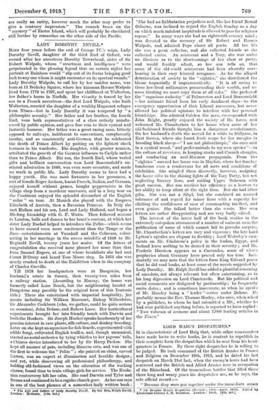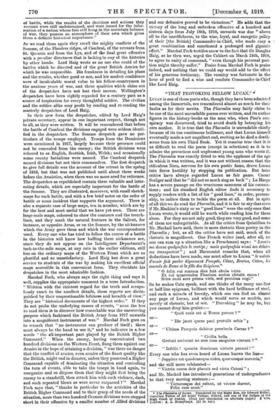LORD }LUG'S DESPATCHES.*
IT is characteristic of Lord Haig that, while other commanders have made haste to write books, he is content to republish in their complete form the despatches which he sent from his head- quarters in France. By these eight despatches he is willing to be judged. He took command of the British Armies in Franca and Belgium on December 19th, 1915, and he dated his last despatch on March 21st last, when the enemy's hosts had been scattered and the British and Allied Armies were in occupation of the Rhineland. Of the tremendous battles that filled those three long and weary years his despatches are, as he says, the sole official record :—
" Because they were put together under the immediate strain
• Sir Douglas Haig's Despatches (December, 1915—April, 1919). Edited by Lieutenant-Colonel J. If. Boraston. London : Dent. 1423. net.]
of battle, while the results of the decisions and actions they recount were still undetermined, and were issued for the infor- mation of a nation whose fate still hung in the uncertain balance of war, they possess an atmosphere of their own which gives them a definite historical importance."
As we read them again they recall the mighty conflicts of the Somme, of the Flanders ridges, of Cambrai, of the retreats from St. Quentin and from the Lys, and of the final great offensive with a peculiar directness that is lacking in any of the histories by other hands. Lord Haig wrote as no one else could of the battles which he directed and of the great British Armies for which he was responsible. His frankness in detailing his plans and the results, whether good or not, and his modest confidence were of incalculable moral value to his fellow-countrymen in the anxious years of war, and these qualities which shine out of the despatches have not lost their savour. Wellington's despatches have been rightly regarded for a century past as a source of inspiration for every thoughtful soldier. The civilian and the soldier alike may profit by reading and re-reading the masterly despatches of Lord Haig.
In their new form the despatches, edited by Lord Haig's private secretary, appear in one important respect, though not in all, as they were written. It will be remembered that before the battle of Cambrai the divisions engaged were seldom identi- fied in the despatches. The Somme despatch gave no par- ticulars of the troops employed. Troops from the Dominions were mentioned in 1917, largely because their presence could not be concealed from the enemy ; the British divisions were referred to as English, Scottish, Irish, Welsh; and occasionally some county battalions were named. The Cambrai despatch named divisions but not their commanders. The first despatch to give full details was the account of the retreat in the spring of 1918, but that was not published until about three weeks before the Armistice, when there was no more need for reticence. The despatches as republished contain these valuable and inter- esting details, which are especially important for the battle of the Somme. They are illustrated, moreover, with small sketch- maps for each battle, and with a few brief notes on the order of battle or some incident that supports the argument. There is also a separate case of large maps, ten in number, which are by far the best and most useful that we have yet seen. These are large-scale maps, coloured to show the contours and the trench- lines, and they mark the natural features in the Salient, for instance, or opposite Arras, or on the Somme, by the nicknames which the Army gave them and which the war correspondents used. Every one who has tried to follow the course of a battle in the histories will know how baffling these nicknames are, since they do not appear on the Intelligence Department's inch-to-the-mile maps, at any rate in the earlier editions, still
less on the ordinary maps of the Western Front which are so plentiful and so unsatisfactory. Lord Haig has done a great
service to students of the war by making his excellent official maps accessible in this convenient form. They elucidate his despatches in the most admirable fashion.
Marshal Foch, .who always says the right thing and says it well, supplies the appropriate comment in a terse Introduction. " Written with the strictest regard for the truth and scrupu-
lously exact to the smallest details, these reports are distin- guished by their unquestionable loftiness and breadth of view."
They are " historical documents of the highest order." If they do not probe the underlying causes of events, " none the less to read them is to discover how remarkable was the unswerving
purpose which fashioned the British Army from 1917 onwards into a magnificent instrument of war." Marshal Foch goes on
to remark that " no instrument can produce of Reef ; there must always be the hand to use it," and he indicates in a few words " the all-important part played by the British Higher Command." When the enemy, having concentrated two hundred divisions on the Western Front, flung them against our Armies in the hope of attaining a decision, " was there no danger that the Conflict of armies, even armies of the finest quality like the British, might end in disaster, unless they possessed a Higher Command capable of dominating the situation and controlling the turn of events, able to take the troops in hand again, to reorganize and so dispose them that they might first bring the enemy to a standstill, then attack him with such violence, dash, and such repeated blows as were never surpassed ? " Marshal Foch says that, "thanks in particular to the activities of the British Higher Command and to their grasp of the needs of the situation, more than two hundred German divisions were stopped
short in their offensive by a smaller number of Allied divisions
and our defensive proved to be victorious." He adds that the victory of the long and unbroken offensive of a hundred and sixteen days from July 18th, 1918, onwards was due " above all to the unselfishness, to the wise, loyal, and energetic policy of their [the British] Commander-in-Chief, who made .easy a great combination and sanctioned a prolonged and gigantic effort." Marshal Foch testifies anew to the fact that Sir Douglas Haig, as he then was, urged the Cabinet on March 24th, 1918, to agree to unity of command, " even though his personal posi- tion might thereby suffer." Praise from Marshal Foch is praise indeed, and nothing that we could say would add to the effect of his generous testimony. The country was fortunate in the hour of peril to find a wise and resolute Commander-in-Chief like Lord Haig.















































 Previous page
Previous page